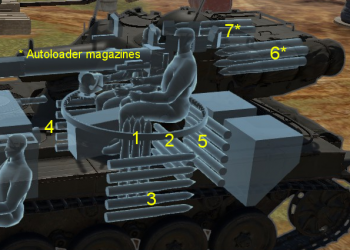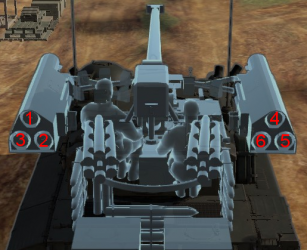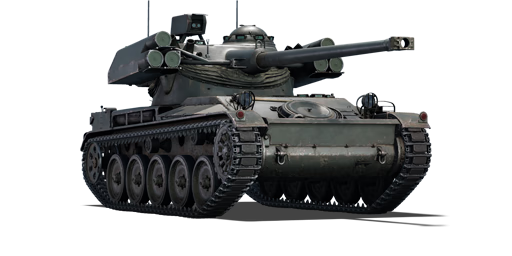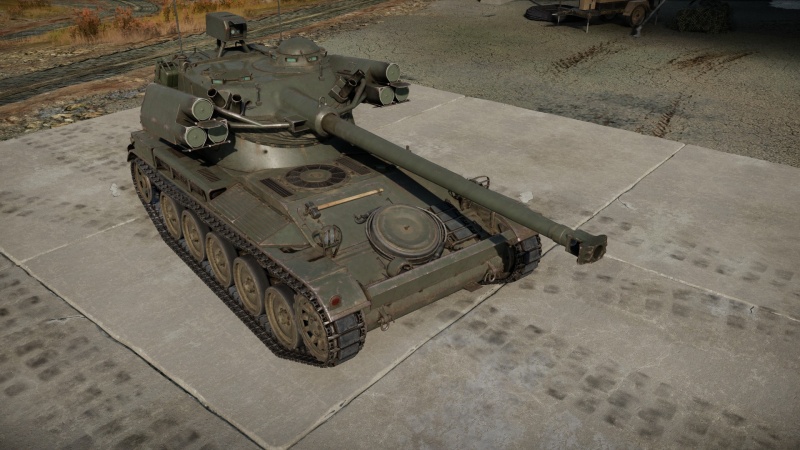Difference between revisions of "AMX-13 (HOT)"
(→Pros and cons: Add missile oscillation issue) |
Colok76286 (talk | contribs) (Edits) |
||
| Line 187: | Line 187: | ||
'''Cons:''' | '''Cons:''' | ||
| − | * Missiles oscillate up and down multiple times around aim point, very difficult to aim below | + | * Missiles oscillate up and down multiple times around aim point, very difficult to aim below 700 m |
* Since ATGMs are stored outside the tank turret, stray artillery shells can hit and detonate ammo | * Since ATGMs are stored outside the tank turret, stray artillery shells can hit and detonate ammo | ||
* Horrendous gun performance at top tier, you will be unable to penetrate almost all enemies frontally | * Horrendous gun performance at top tier, you will be unable to penetrate almost all enemies frontally | ||
Latest revision as of 20:58, 6 October 2024
| This page is about the French light tank AMX-13 (HOT). For other versions, see AMX-13 (Family). |
Contents
Description
The AMX-13/75 FL-10 (HOT) is the fourth subvariant of the AMX-13/75 FL-10, which is the first variant of the AMX-13 light tank family. Except for the six HOT anti-tank guided missiles (ATGMs) installed on two launchers next to the turret, it is similar to the standard AMX-13/75 FL-10. The HOT (Haut subsonique Optiquement Téléguidé Tiré d'un Tube) is a second-generation long-range ATGM. It was designed to replace the older SS.11 wire-guided ATGMs used in French and West German service. The design was created in partnership with the German company Bölkow and the French company Nord. HOT ATGMs have a greater range, higher flight speed, and are semi-automatically guided rather than manually guided like SS.11 ATGMs. It has become one of the most successful missiles in its class, with tens of thousands of missiles manufactured, utilized by more than a dozen countries throughout the world, and deployed in several wars.
Introduced in Update 1.75 "La Résistance", the AMX-13/75 FL-10 (HOT) features the same playstyle as the standard AMX-13/75 FL-10. This light tank is exceptionally fast and agile, but it does it at the expense of its armour. However, this light tank encounters far more advanced opponents than its predecessor, the AMX-13/75 FL-10 (Char Lance SS.11). As a result, despite being a light tank with a powerful main gun, it struggles to penetrate most adversaries in combat. Instead, it must rely on the six HOT ATGMs to eliminate foes at great ranges. The HOT ATGMs are incredibly effective against even the most protected opponents. It is recommended that it be used as a long-range tank destroyer, with its superior ATGMs picking off enemies over great distances. The primary armament should be used only when the enemy is revealing its sides without paying attention.
General info
Survivability and armour
Armour type:
- Cast homogeneous armour (Turret base, Turret front)
- Rolled homogeneous armour
| Armour | Front (Slope angle) | Sides | Rear | Roof |
|---|---|---|---|---|
| Hull | 20 mm (67°) Front glacis 20-40 mm (5-50°) Lower glacis |
20 mm | 15 mm Top 15 mm (45°) Bottom |
10 mm 5 mm Engine grille |
| Turret | 40 mm (32-47°) Turret front 40 mm (12-41°) Turret base 40 mm (15-75°) Barrel shroud |
20 mm (0-30°) Turret 20 mm (12-14°) Turret base |
20 mm Turret bustle 20 mm (17-22°) Pivot ball 10 mm (77-90°) Turret underside |
10 mm |
| Armour | Sides | Roof | ||
| Cupola | 20 mm | 10 mm |
Notes:
- Suspension wheels and tracks are 15 mm thick.
- Belly armour is 10 mm thick.
- 8 mm Structural steel firewall separates the driver from the engine.
- The track and wheel on the front glacis offer about 15 mm structural steel thickness.
Mobility
| Game Mode | Max Speed (km/h) | Weight (tons) | Engine power (horsepower) | Power-to-weight ratio (hp/ton) | |||
|---|---|---|---|---|---|---|---|
| Forward | Reverse | Stock | Upgraded | Stock | Upgraded | ||
| Arcade | 68 | 8 | 15 | 418 | 515 | 27.87 | 34.33 |
| Realistic | 61 | 7 | 239 | 270 | 15.93 | 18 | |
Modifications and economy
Armaments
Main armament
| 75 mm SA50 L/57 | Turret rotation speed (°/s) | Reloading rate (seconds) | ||||||||
|---|---|---|---|---|---|---|---|---|---|---|
| Mode | Capacity | Vertical | Horizontal | Stabilizer | Stock | Upgraded | Full | Expert | Aced | Autoloader |
| Arcade | 36 | -6°/+13° | ±180° | N/A | 28.6 | 39.5 | 48.0 | 53.1 | 56.5 | 5.00 |
| Realistic | 17.9 | 21.0 | 25.5 | 28.2 | 30.0 | |||||
Ammunition
| Penetration statistics | |||||||
|---|---|---|---|---|---|---|---|
| Ammunition | Type of warhead |
Penetration @ 0° Angle of Attack (mm) | |||||
| 10 m | 100 m | 500 m | 1,000 m | 1,500 m | 2,000 m | ||
| POT-51A | APBC | 182 | 178 | 162 | 143 | 127 | 113 |
| OE Mle 1951 | HE | 15 | 15 | 13 | 12 | 11 | 10 |
| PCOT-51P | APCBC | 202 | 198 | 180 | 159 | 141 | 125 |
| Shell details | ||||||||||||
|---|---|---|---|---|---|---|---|---|---|---|---|---|
| Ammunition | Type of warhead |
Velocity (m/s) |
Projectile mass (kg) |
Fuse delay (m) |
Fuse sensitivity (mm) |
Explosive mass (TNT equivalent) (g) |
Ricochet | |||||
| 0% | 50% | 100% | ||||||||||
| POT-51A | APBC | 1,000 | 6.4 | - | - | - | 47° | 60° | 65° | |||
| OE Mle 1951 | HE | 753 | 6.2 | 0.2 | 0.1 | 675 | 79° | 80° | 81° | |||
| PCOT-51P | APCBC | 1,000 | 6.4 | - | - | - | 48° | 63° | 71° | |||
Ammo racks

| Full ammo |
1st rack empty |
2nd rack empty |
3rd rack empty |
4th rack empty |
5th rack empty |
6th rack empty |
7th rack empty |
Visual discrepancy |
|---|---|---|---|---|---|---|---|---|
| 36 | 32 (+4) | 28 (+8) | 23 (+13) | 18 (+18) | 13 (+23) | 7 (+29) | 1 (+35) | No |
Notes:
- Shells are modeled individually and disappear after having been shot or loaded.
- Rack 6* and 7* (autoloader magazines) are first stage ammo racks. They total 12 shells.
- These racks get filled first when loading up the tank and are also emptied first.
- As the AMX-13 (HOT) is equipped with an autoloader, manual reloading of the gun is not possible.
- Once the autoloader magazines have been depleted, you can't shoot until the loader has restocked the autoloader. The restocking time is longer than the normal reload time of the gun (about 15 seconds). Take this into account when playing.
- Simply not firing when the gun is loaded will move ammo from racks 1 to 5 into rack 7* then 6*. Firing will interrupt the restocking of the ready racks.
- The depletion order at full capacity is: 6* - 7* - 1 - 2 up to 5.
Additional armament
| HOT ATGM | |||
|---|---|---|---|
| Capacity | Vertical | Horizontal | Stabilizer |
| 6 | N/A | N/A | N/A |
Ammunition
| Penetration statistics | |||||||
|---|---|---|---|---|---|---|---|
| Ammunition | Type of warhead |
Penetration @ 0° Angle of Attack (mm) | |||||
| 10 m | 100 m | 500 m | 1,000 m | 1,500 m | 2,000 m | ||
| HOT | ATGM | 700 | 700 | 700 | 700 | 700 | 700 |
| Missile details | ||||||||||||
|---|---|---|---|---|---|---|---|---|---|---|---|---|
| Ammunition | Type of warhead |
Velocity (m/s) |
Range (m) |
Projectile mass (kg) |
Fuse delay (m) |
Fuse sensitivity (mm) |
Explosive mass (TNT equivalent) (kg) |
Ricochet | ||||
| 0% | 50% | 100% | ||||||||||
| HOT | ATGM | 250 | 4,000 | 23 | 0.05 | 0.1 | 3.8 | 80° | 82° | 90° | ||
Ammo racks

| Full ammo |
Visual discrepancy |
|---|---|
| 6 | No |
Notes:
- The missiles are fired from 1 to 6.
- It is not possible to select how many missiles to bring into battle.
Machine guns
| 7.5 mm MAC 31 | ||||
|---|---|---|---|---|
| Mount | Capacity (Belt) | Fire rate | Vertical | Horizontal |
| Coaxial | 4,950 (150) | 551 | N/A | N/A |
Usage in battles
The AMX-13 HOT cannot be played as the standard AMX-13 due to the increased battle rating. This particular modification should be used always as a support vehicle. The commander should always keep this in mind:
- ATGM: frontal engagements at 100 m (the ATGM has to fly up a couple of metres to be able to follow the crosshair due to the launcher placement). Distance engagements past 200-300 m.
- 75 mm gun: Side shots at distances between 0-200 m
It should be noted that the AMX-13 HOT can face Leopard 1s, meaning the main gun is capable of destroying the tank from all sides. Enemy targets like T-54/55 will only be able to be penetrated frontally with the ATGM and from the sides with the 75 mm gun. The T-55AM-1 can be one of the toughest enemies it will face as the ATGM will not be able to penetrate the turret mantlet when seen directly from the front, aim for centre-mass with the ATGM.
Do not stay alone with this tank unless you are being a scout vehicle (as it has that capacity).
When in urban combat:
The AMX-13 should be played as a flanker or as a "medic" vehicle thanks to being able to repair friendlies due to being a light tank. It should be noted that the ATGM use is reduced considerably when in urban combat due to the way the launchers are placed. Use your mobility, scouting capabilities and autoloader to mark, disable and support allies in killing enemy vehicles. When facing Russian tanks, always try to get side shots. When facing NATO tanks (excluding heavy tanks and WW2 tanks), side shots might not be required depending on the armour the AMX-13 is facing.
When in rural combat:
The AMX-13 should be played as a scout or as an ATGM sniper. Be aware of your zoom sights as the AMX-13 lacks potent zoom. Use ATGMs when engaging far targets as your main gun will lose penetration at ranges longer than 300 m, reducing spalling or not penetrating enemy armour at all. Use your scout ability to mark targets for teammates and let them engage them. Using your speed, you are able to flank the enemy as you are able to cross the map side to side with relative ease and speed.
Pros and cons
Pros:
- Mouse-guided HOT missiles, capable of breaching some ERA screens on direct hit
- Can annihilate a lot of tanks in quick succession since all 6 ATGM are always armed and ready to fire
- Reasonably fast turret rotation speed
Cons:
- Missiles oscillate up and down multiple times around aim point, very difficult to aim below 700 m
- Since ATGMs are stored outside the tank turret, stray artillery shells can hit and detonate ammo
- Horrendous gun performance at top tier, you will be unable to penetrate almost all enemies frontally
- Long replenishment time for the autoloader after the 12 shots have been spent
- Only 6 ATGMs
- Oscillating turret causes up and down bobbing of the gunsight when coming to a stop
- Mediocre mobility for a light tank
History
Development
Development of the AMX-13 began in 1946 in response to a requirement by the French Army for a light tank to support paratroopers. It was designed at Atelier de Construction d'Issy-les-Moulineaux (AMX). A long line of prototypes lead to the production model. The first prototype was the AMX-13 2A in 1948, with four road wheels. Next came the 2B with five road wheels and a raised idler wheel, and the 2C with the FL-10 turret and two return rollers. The 2D introduced an arrangement with four return rollers.
Design
The turret held the commander and gunner, and was set to the rear of the vehicle. The hull was very compact and low profile, with the engine on the right side and the driver in the front, left side.
The main feature of the AMX-13 was the FL-10 oscillating turret, armed with a 75 mm gun with an automatic loader system fed by two six-round magazines, for a total of 12 rounds in the autoloading mechanism. The gun could depress 8° and elevate 12°, with 5° per second of elevation speed. The turret could rotate 360° with 30° per second of traverse speed. A TCV 107 laser rangefinder was provided to the gunner. 6 smoke grenade launchers were fitted on the turret, with 6 more grenades stored in the vehicle. One coaxial 7.62 mm machine gun was fitted, with 1,800 rounds in belts of 200. Another 7.62 mm machine gun could be fitted on an anti-aircraft mount with 1,800 rounds.
The gasoline engine produced 250 horsepower, and the manual transmission had five forward and one reverse gear. The suspension was of the torsion bar type. The drive sprockets were in the front, return rollers in the back, and there were five road wheels and four return rollers. The AMX-13 could reach a speed of 60 km/h, and it had a range of 400 km.
The protection of the AMX-13, it being a light tank, was not great. It could withstand heavy machine gun and low-calibre autocannon rounds from the front, but the sides could not even withstand heavy machine gun fire. An appliqué armour package was developed to increase protection at the choice of the user.
Production
Production began in 1952, at Atelier de Construction Roanne (ARE). Over 7,000 AMX-13s of all variants were produced, seeing export to a number of nations as well as seeing service with the French Army. Production shifted to Creusot-Loire at Chalon-sur-Saône in 1964, since ARE began producing the AMX-30 in that year.
Service
The French Army received most of the original 75 mm-armed version, with about 3,000 entering service. They were assigned to the regular armoured units, which were mostly filled with M47 and M48 Patton medium tanks at the time. AMX-13 squadrons had four tanks, and were split into two sections of one infantry section and one light tank section each, along with an ammunition truck and command vehicle. These squadrons were used for screening and reconnaissance, locating enemy forces and engaging them. After the first section had engaged the enemy and was reloading, the second section engaged the enemy. The process of alternating reloading and firing between the sections allowed the tanks to hold off the enemy until medium tanks arrived.
In the 1960's, the AMX-30 entered service. AMX-13s were used during the decolonization war in Algeria (1954-1962), although they saw little combat due to the lack of opposition and the terrain. After the French AMX-13s were up-gunned with the 90 mm gun, they often saw service in foreign theaters of operation due to their relative inexpensiveness. The AMX-13s were decommissioned and put into reserve starting in 1985.
HOT variant
The AMX-13 HOT was a prototype made by AMX featuring HOT launchers and ATGM as an intent to upgrade the AMX-13 SS.11
Media
- Skins
- Videos
See also
- Vehicles equipped with the same missile
External links
| Ateliers de construction d'Issy-les-Moulineaux (AMX) | |
|---|---|
| Light tanks | |
| AMX-13 | AMX-13-M24 · AMX-13 (FL11) · AMX-13 · AMX-13 (SS.11) · AMX-13-90 · AMX-13 (HOT) |
| Armoured cars | AMX-10RC |
| Medium tanks | AMX M4 · AMX-50 (TOA100) |
| MBTs | |
| AMX-30 | AMX-30 · AMX-30 ACRA · AMX-30 (1972) · AMX-30B2 · AMX-30B2 BRENUS · AMX-30 Super |
| AMX-32/40 | AMX-32 (105) · AMX-32 · AMX-40 |
| Heavy tanks | AMX-50 Surbaissé · AMX-50 Surblindé |
| Tank destroyers | ELC bis · AMX-50 Foch |
| SPAAGs | AMX-13 DCA 40 · AMX-30 S DCA |
| Export | AMX-13 |
| France light tanks | |
|---|---|
| AMC.34/35 | AMC.34 YR · AMC.35 (ACG.1) |
| H.35/39 | H.35 · H.39 · H.39 "Cambronne" |
| AMX-13 | AMX-13 (FL11) · AMX-13-M24 · AMX-13 · AMX-13 (SS.11) · AMX-13-90 · AMX-13 (HOT) |
| Wheeled | AML-90 · AMX-10RC · Vextra 105 |
| AMD.35 | AMD.35 · AMD.35 (SA35) |
| E.B.R. | E.B.R. (1951) · E.B.R. (1954) · E.B.R. (1963) |
| Other | FCM.36 · R.35 (SA38) · Char 25t · MARS 15 · VBCI-2 (MCT30) |
| Austria | SK-105A2 |
| Great Britain | ▄Crusader Mk.II |
| Netherlands | CV 9035NL |
| USA | LVT-4/40 · ▄M3A3 Stuart |





